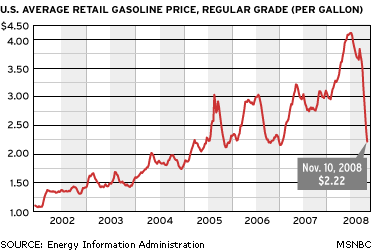 As of Monday, the average price of gasoline in the U.S. was down to $2.22 a gallon, brushing up against $1.50 in some places. The price of oil was under $60/bbl.
As of Monday, the average price of gasoline in the U.S. was down to $2.22 a gallon, brushing up against $1.50 in some places. The price of oil was under $60/bbl.
When gas and oil prices fall, there are always two reactions: first, great lamentations that alternative and renewable energy investments no longer make economic sense, and second, wishes (upon a star) that America had the political chutzpah to impose a new gas tax.
Despite its appeal in some quarters, the gas tax is not a good idea. It costs enormous political capital and pays insufficient returns. If one had to be done and someone were willing to sail through the political sh*tstorm to do it, it ought to be like Troy Schneider suggests here — revenue neutral, paid for with a reduction in payroll taxes. It would be a tidy, self-contained program, sheltering the revenue from pork-hungry hands; it would produce more of what we want (work) and less of what we don’t (pollution). It’s a good tweak.
What it will not do is significantly reduce the greenhouse gas emissions of the transportation sector. No reasonable price signal, on carbon generally or gasoline specifically, will do that. The solution is not more virtuous behavior or slightly more fuel economy, but new infrastructure.
To achieve the atmospheric carbon targets scientists urge upon us with increasing dread, emissions from transportation need to drop exponentially, not logarithmically.
Since the turn of the century we’ve seen the price of a barrel of oil rocket from $20 to well over $100 and now back down to $60. U.S. average gas prices have gone from under a buck per gallon to north of $4, only to plunge now to just over $2. In the midst of this kind of volatility and unpredictability, no gas or carbon tax with a chance of passing will send a price signal big enough to be decisive. As Joe Romm points out, it would take a carbon price of $400 per metric ton — wildly higher than anything contemplated in developed world carbon markets — to increase the price of gasoline by $1 a gallon.
Prices will push consumers to conserve, but that’s almost beside the point. Cars and trucks aren’t going to change in degree of fuel economy, via tweaks to wind resistance and fuel injection systems and commuting habits. They’re going to change in kind. We’ll soon find ourselves seeking the most rapid possible turnover of the fleet from gasoline vehicles to non-gasoline vehicles. Whether plug-in hybrids, biofuel vehicles, or hydrogen vehicles win out in the end (hint: it will be plug-ins), it will require new fueling infrastructure, either an enhanced electrical grid, biofuel stations, or hydrogen stations. We also need large-scale shifts to public transit and rail, more bike and pedestrian paths, and transit-oriented development.
In short, the changes we need in transportation are not something car companies or consumers can do on their own. What’s needed is beyond new habits and new vehicles — it’s new infrastructure.
We need a transportation infrastructure for the 21st century. You don’t get highways by raising the price of horses or bridges by raising the price of ferry boats. You don’t get an electrical grid by raising the price of lamp oil. And you don’t get a 21st century transportation infrastructure — rail, transit, bike and pedestrian paths, grid, and PHVs — by raising the price of gasoline. That’s fiddling on the margins.
We need to start thinking at the scale of the problem.

